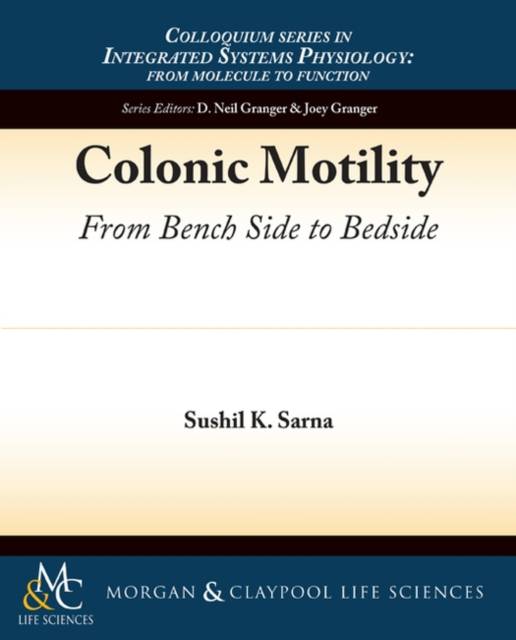
- Retrait gratuit dans votre magasin Club
- 7.000.000 titres dans notre catalogue
- Payer en toute sécurité
- Toujours un magasin près de chez vous
- Retrait gratuit dans votre magasin Club
- 7.000.000 titres dans notre catalogue
- Payer en toute sécurité
- Toujours un magasin près de chez vous
Colonic Motility
From Bench Side to Bedside
Sushil K Sarna
Livre broché | Anglais | Colloquium Integrated Systems Physiology: From Molecule to Function to Disease
68,95 €
+ 137 points
Description
Three distinct types of contractions perform colonic motility functions. Rhythmic phasic contractions (RPCs) cause slow net distal propulsion with extensive mixing/turning over. Infrequently occurring giant migrating contractions (GMCs) produce mass movements. Tonic contractions aid RPCs in their motor function. The spatiotemporal patterns of these contractions differ markedly. The amplitude and distance of propagation of a GMC are several-fold larger than those of an RPC. The enteric neurons and smooth muscle cells are the core regulators of all three types of contractions. The regulation of contractions by these mechanisms is modifiable by extrinsic factors: CNS, autonomic neurons, hormones, inflammatory mediators, and stress mediators. Only the GMCs produce descending inhibition, which accommodates the large bolus being propelled without increasing muscle tone. The strong compression of the colon wall generates afferent signals that are below nociceptive threshold in healthy subjects. However, these signals become nociceptive; if the amplitudes of GMCs increase, afferent nerves become hypersensitive, or descending inhibition is impaired. The GMCs also provide the force for rapid propulsion of feces and descending inhibition to relax the internal anal sphincter during defecation. The dysregulation of GMCs is a major factor in colonic motility disorders: irritable bowel syndrome (IBS), inflammatory bowel disease (IBD), and diverticular disease (DD). Frequent mass movements by GMCs cause diarrhea in diarrhea predominant IBS, IBD, and DD, while a decrease in the frequency of GMCs causes constipation. The GMCs generate the afferent signals for intermittent short-lived episodes of abdominal cramping in these disorders. Epigenetic dysregulation due to adverse events in early life is one of the major factors in generating the symptoms of IBS in adulthood. Table of Contents: Introduction / Regulatory Mechanisms / Colonic Motility in Health / Colonic Motility Dysfunction / References
Spécifications
Parties prenantes
- Auteur(s) :
- Editeur:
Contenu
- Nombre de pages :
- 157
- Langue:
- Anglais
- Collection :
Caractéristiques
- EAN:
- 9781615041503
- Date de parution :
- 10-01-11
- Format:
- Livre broché
- Format numérique:
- Trade paperback (VS)
- Dimensions :
- 190 mm x 235 mm
- Poids :
- 281 g







